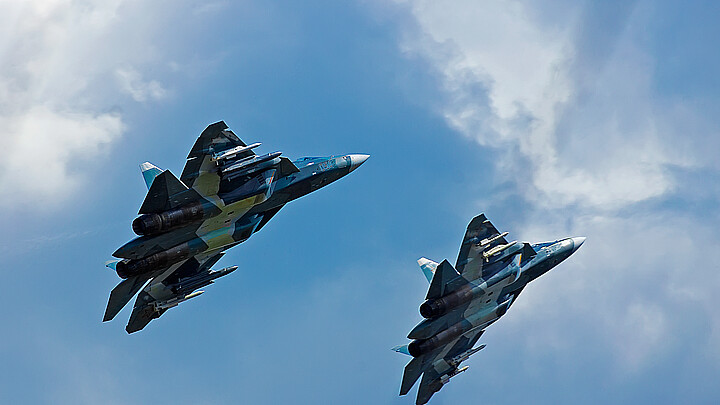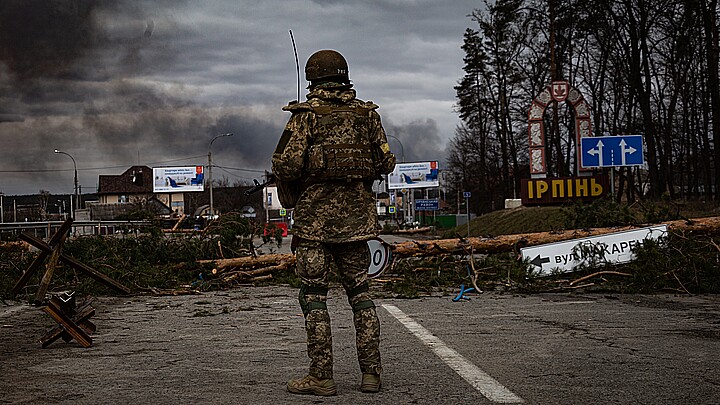Politics
New ICBM test from Russia prompts renewed speculation that Putin may use nuclear weapons
The Russian state news agency, TASS, said that "this unique weapon will force everyone who tries to make threats against Russia to think twice"
April 20, 2022 11:42pm
Updated: April 21, 2022 11:36am
Moscow's launch of a new intercontinental ballistic missile on Wednesday revived speculation in the West about whether Russian President Vladimir Putin would use nuclear warheads against his perceived enemies.
"We are not at the point where we are tossing dice to see what comes up," a U.S. intelligence official told Just the News. "But we're definitely aware that this test took place at this time, and are paying attention to what this might mean."
Russia test-fired the new nuclear-capable Sarmat ICBM from the Plesetsk Cosmodrome in the country's northwest Arkhangelsk Region, sending it some 6,000 kilometers to strike targets at the Kura proving ground on the Kamchatka Peninsula, the Kremlin said.
The Russian state news agency, TASS, said that "this unique weapon will force everyone who tries to make threats against Russia to think twice."
Putin hailed the missile. "It is a great and landmark event in the development of advanced weapon systems in the Russian army," he said.
"It has no analogs in the world and will not have any for a long time to come,” Putin said. "This truly unique weapon will bolster the combat capabilities of our Armed Forces, will reliably safeguard Russia's security from external threats and will make those who in the frenzy of rabid and aggressive rhetoric are trying to threaten our country think twice.”
The test and the rhetoric seemed to leave the Pentagon officially unfazed.
"Russia properly notified the United States under its New START treaty obligations that it planned to test this ICBM," Pentagon Press Secretary John Kirby said in a Wednesday statement. "Such testing is routine and was not a surprise. We did not deem the test to be a threat to the United States or its allies."
Privately, the intelligence analyst said, "We have to consider all the possibilities of what this could mean." The analyst is not authorized to talk to the media, and spoke on the condition of anonymity.
The launch could simply be posturing by Putin, where Moscow wants to showcase a powerful arsenal ahead of Russia's annual Victory Day parade on May 9, the analyst said.
But Ukrainian President Volodymyr Zelensky and Western officials, including CIA Director William Burns, have warned that the threat of nuclear attack must be taken seriously.
"Given the potential desperation of President Putin and the Russian leadership, given the setbacks that they've faced so far, militarily, none of us can take lightly the threat posed by a potential resort to tactical nuclear weapons or low-yield nuclear weapons," Burns said last week.
Those setbacks include heavy losses of soldiers and equipment during the nearly two months-long assault on Ukraine.
A former NATO political officer who specialized in Ukraine offered what she termed a "little bit calmer" view about Russia potentially using nuclear weapons.
"I think Russia definitely wants us to fear that possibility," Sam de Bendern, a former NATO Ukraine political officer, said during a Tuesday appearance on the BBC's Ukrainecast podcast. "But if you look at what Russia has done so far, in this war, whenever an atrocity has been committed, they've blamed it on the Ukrainians. They've said it's fake."
Russia blamed Ukraine for preparing to use biological or chemical weapons, and for launching attacks on their own cities, de Bendern said. But a nuclear weapon would be different.
"If they were to use a tactical weapon, they can't blame it on anyone else but themselves," she said. "They would have to own up and take the full blame, both in front of their own people and in front of the whole world. So I think that considering Russia's behavior, and its information warfare, using tactical weapons would really be an issue of last resort."
Russian military doctrine allows the country to use nuclear warheads, the American intelligence analyst said.
De Bendern agreed.
"I have no access to what the CIA is saying," she said. "They say that it's possible, and it definitely is possible, they have the means. The military doctrine allows them to do so. But again, this would be the last resort, in my view."
The Pentagon did not immediately respond to questions about plans to monitor potential nuclear hostilities from Moscow.
"The Department remains focused on Russia's unlawful and unprovoked aggression against Ukraine," Kirby said.








